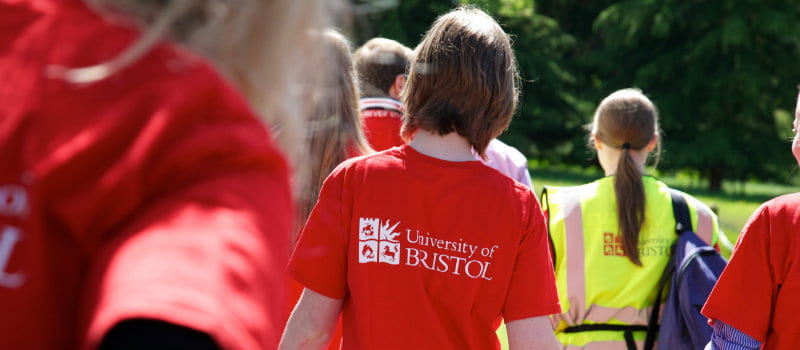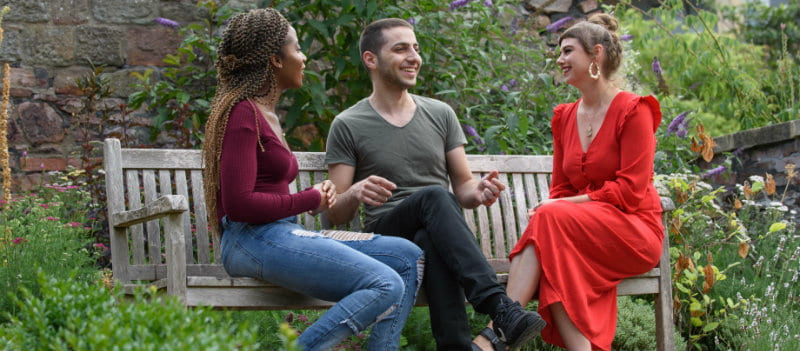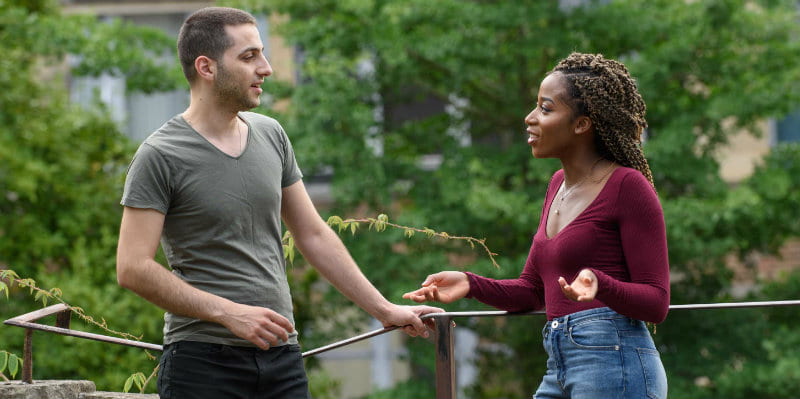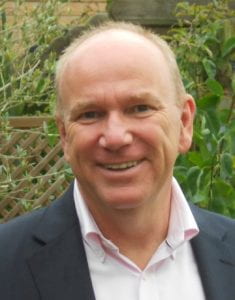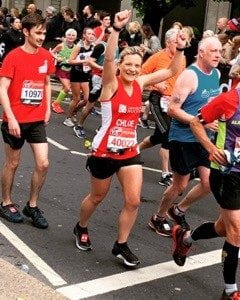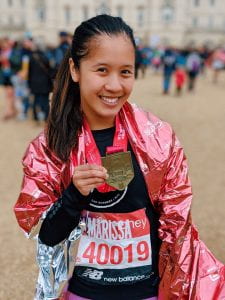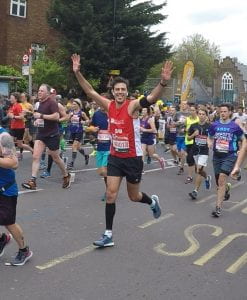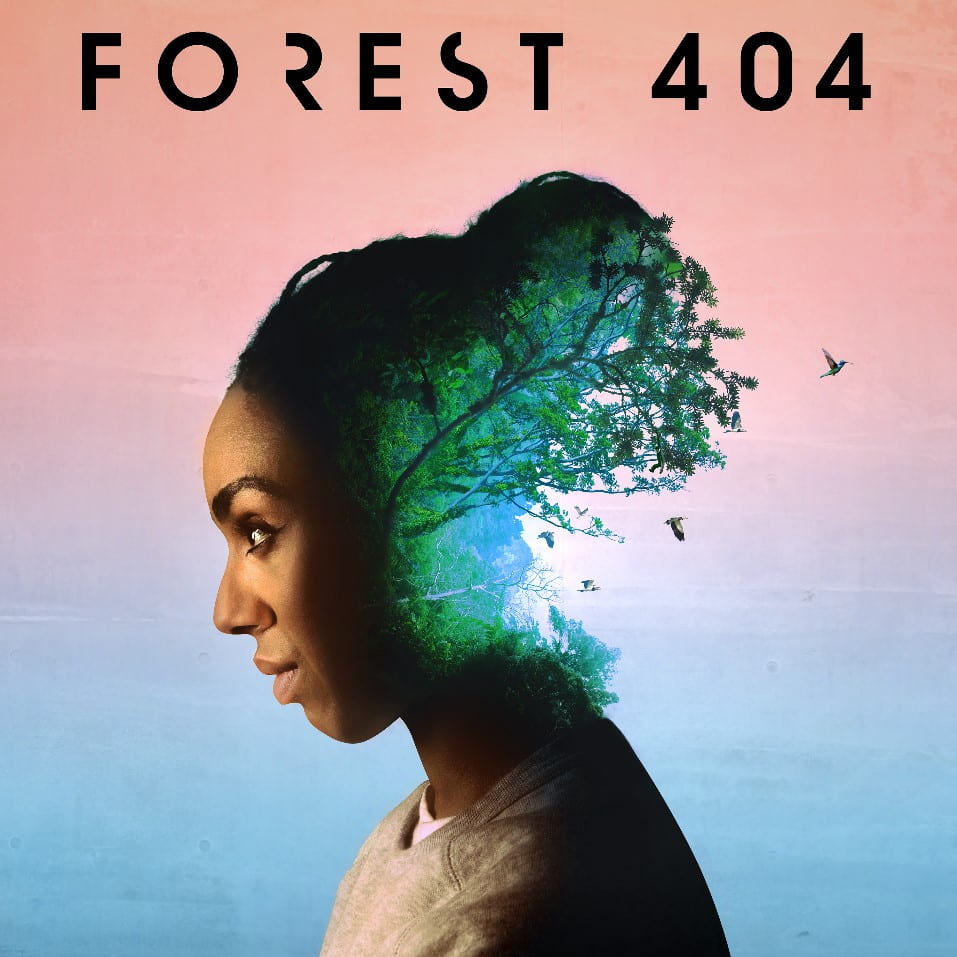On 30th April 2019 a group of 30 London Branch of University of Bristol Alumni gathered for the third installment of our Secret London series of London Walks, guided by a Blue Badge Guide.
Chris Green, a fellow Bristol Graduate, led our group on an informative walk around the City of London. Starting at Trinity Square Gardens (near Tower Hill) and ending in the Williamson Nicholson’s pub on picturesque Bow Lane, we heard about trade, architecture and characters spanning from Roman times to the modern day.
It is too easy to take one’s city and surroundings for granted as we go about our daily business, paying little attention to the history around us. Our walks aim to highlight the details we so often miss, thus keeping this hidden knowledge alive.
Although we walked streets which were familiar to many of us, it is always inspiring to hear of those feet who walked before us and look up to see the marks they left on the city we love.
The event concluded with a chance to socialise over food and drinks and appeared to be enjoyed by all.
Student Mental Health & Wellbeing: Bristol continues to make this a priority
Everyone at the University of Bristol is committed to doing all that we can to keep our students safe.
I am aware that many of you in our global community of alumni and friends may have seen the recent media coverage surrounding the tragic death of one of our students, Natasha Abrahart. I realise that this may result in you wondering what Bristol is doing to ensure that our students are supported in all areas of life at university, so that they too may enjoy the Bristol experience that you once had. Please rest assured that we continue to develop and strengthen the support available to all of our students. We have reviewed everything we do in this critical area and introduced a whole-institution approach to mental health and wellbeing with substantially strengthened support for our students in their accommodation, in academic schools and through central support services.
This has enabled us to provide more proactive support for student wellbeing, both for our students during their transition into university and to help create a sense of community and wellbeing during their time with us. Our enhanced teams are also able to provide direct support for students whenever they need it, 24/7, throughout the year.
We have also implemented a new Strategy for Student Mental Health & Wellbeing and you can read more about what support and advice is available to students in our online resource hub.
I hope that this information will be helpful in understanding what we are doing and how we are taking the wellbeing of everyone at Bristol very seriously.
The University’s response to media questions about the death of a student will always be guided by our commitment to respect the dignity of our student and our desire to protect the privacy and wishes of the student’s family and friends, and our university colleagues. We also ensure that any communications we issue prior to and during an inquest comply with the legal processes surrounding it.
With this in mind, I wanted to share with you the sentiments of our Deputy Vice-Chancellor and Provost, Professor Judith Squires, and to reassure you that your University continues to make student – and indeed staff – wellbeing a key priority. Judith’s message can be read in full on our main University website.
Stephen O’Connor, Director, Development and Alumni Relations
Bristol – a place of sanctuary
A sanctuary is a refuge, a place where those within are protected and encouraged to grow. And that is exactly what the Sanctuary Scholarships at the University of Bristol do for the students who receive them: they offer refugee and asylum-seeking students the opportunity to grow in a safe place.
It’s fitting that the University offers these scholarships, after all Bristol is a City of Sanctuary, which makes it part of a growing network of other like-minded cities that are proud to offer sanctuary to people fleeing violence and persecution.
For many displaced people the opportunity to study at university is just a dream. But because of this programme – supported by £45,000 of donations from our generous alumni and friends – some of those dreams are becoming a reality.
Since the programme’s inception 32 Sanctuary Scholarships have been awarded. These bright students are studying a range of subjects, including International Development, European and Global Governance, as well as working on the International Foundation Year programme – which provides students with the skills and knowledge necessary to progress to undergraduate study.
We spoke to three of the Scholars and asked them a few questions about their time at Bristol. Their answers are moving, and we hope they’ll shed some more light on how important this scholarships programme is.
As you can understand, these students have requested to remain anonymous.
What are you studying and why did you choose that subject?
I am doing an MSc in International Development. The reason behind my choice was the atrocious civil war that has been going on for about eight years in my home country, Syria. When the war comes to an end, there will be a great need for professional staff to rebuild the country and do development projects. Apart from Syria, the large number of poor around the world triggered my interest in the development sector, I want to learn and investigate the best ways to extricate the deprived from severe poverty.
Does Bristol feel like home?
In general, next to my home town and country, I have come to the conclusion that Bristol is my home. Firstly, the city is interesting. There are so many interesting places for instance, Clifton Suspension Bridge, Bristol Cathedral, and St Mary Redcliffe Church. I find the people supportive and friendly and I have got friends that I consider to be family. Therefore, if home is where your family live, I can say I feel at home here. Bristol is a great city, with a great university – the people are friendly, supportive and above all a socially inclusive people.
How would you describe the university to someone who has never been here?
I would say that the University of Bristol is the best university in the world. They helped me to fulfil my dream and understand the bigger picture for our world in academic and professional manners. People who are working at the University of Bristol are kind, caring, supportive and professional.
How did it make you feel when you found out you got a Sanctuary Scholarship?
I could not believe when I received the email that I was chosen among numerous other worthy applicants. I started crying as I could not believe it — especially since my financial situation means that I will only be able to complete my studies with financial support from the University because I was an asylum seeker.
The asylum process has been a largely unpleasant experience. As I do not have the right to work, I am forced to survive on £36.95 per week from the government. Before receiving the Sanctuary Scholarship, this had to cover the cost of food, drink, clothes, transportation and other living costs, and it was never enough. I often had to walk around five miles a day so I could go to the city centre to purchase groceries, and at times I would go without a meal or two so I can pay for the bus home. Every week, I had to do without so I can pay for other important things.
So, receiving this scholarship has saved my life and gave me the sense that I am a person of value, presence and purpose. I would like to take this opportunity to express my appreciation and gratitude to the hidden musketeers who support me and made my dream come true, including: donors, management, admin and professors. I could not reach this far without your support. From the bottom of my heart, thank you.
**********************************************************************************************************
Thank you to everyone who has donated so far to our Sanctuary Scholarships programme. You really are making a difference to people. If you would like to give a gift today please visit our online donation page.
A short film about the Scholars called I’m Here has been created by two University of Bristol students, Jessica Powell (University of Bristol TV), Amy Leigh-Hatton (President of the Student Action for Refugees society) and also Sally Patterson (Bristol SU Equality, Liberation and Access Officer). The film focuses on the stories of three Sanctuary Scholars, with an emphasis on who they are as individuals, rather than their pasts. They each walk to their favourite place in Bristol, these journeys mirroring the inspiring journeys they have made so far. You can view this film now on YouTube.
It’s national Volunteers’ Week – thank you to our Bristol Volunteers
A message from Professor Hugh Brady, Vice-Chancellor
Volunteers’ Week is a national celebration of the fantastic contribution volunteers make across the UK. This week we have been celebrating our Bristol Volunteers, who have given their time and expertise this last academic year, as mentors, advisors, speakers, organisers, and much more. Watch the video to hear your personal thanks from Professor Hugh Brady, President and Vice-Chancellor.
Bristol Volunteers support Bristol and uphold its values all over the world, by enhancing students’ experience and employability, helping students make decisions about study and careers and leading our networks. We are very grateful for the outstanding contribution of all our volunteers: your advice, experience and support have an enormous impact on our students, the alumni community and the University.
Below, read about three individual volunteer experiences. If you are keen on becoming part of the Bristol Volunteer community, find out more about opportunities to get involved on our dedicated volunteering opportunities page.
Why I am a Bristol Volunteer?
“I volunteer as a mentor for undergraduates interested in working in the voluntary sector. I have worked with several intelligent, enthusiastic and passionate young people to date, some of whom have gone on to become interns that have delivered some outstanding pieces of work for the British Red Cross. A small amount of your time can provide some valuable insights for those just getting started – a really rewarding opportunity.”
Helen Sipthorp (BSc 2008)
“I thought volunteering was about giving back, spending time and listening and helping… But it’s so much more. I think I learn more than the students. I think I’m back in my learning zone. I’m being tested, questioned, put under pressure. The students I meet conduct a panel interview on me. They come to my office. They ask penetrating questions. They don’t accept waffle and excuses. They’re good. They’re strong. This is not for the faint- hearted. The future is bright. And it’s coming from Bristol.”
Paul Moran (MSc 2012)
“I have been organising or coordinating an annual reunion of alumni living in Eastern Canada for about 15 years. I enjoy doing this because it has brought me a wonderful group of friends, who have become close because of our shared beginnings. Having those formative years of our lives in common at Bristol gives us endless conversation topics, and several of the group have been back to Bristol and share their visits with us. We are all very grateful for the start in life that Bristol gave us.”
Heather Proctor (BSc 1964)
Are you volunteering for Bristol? There is still time to enter our Thank You Draw. Tell us in 50 – 70 words, “Why I am a Bristol Volunteer”, attach a photo of your time here, and we will enter you for your chance to win an exclusive Bristol Bundle. Submit your entries to alumni-volunteers@bristol.ac.uk
Become a Bristol Volunteer: current opportunities
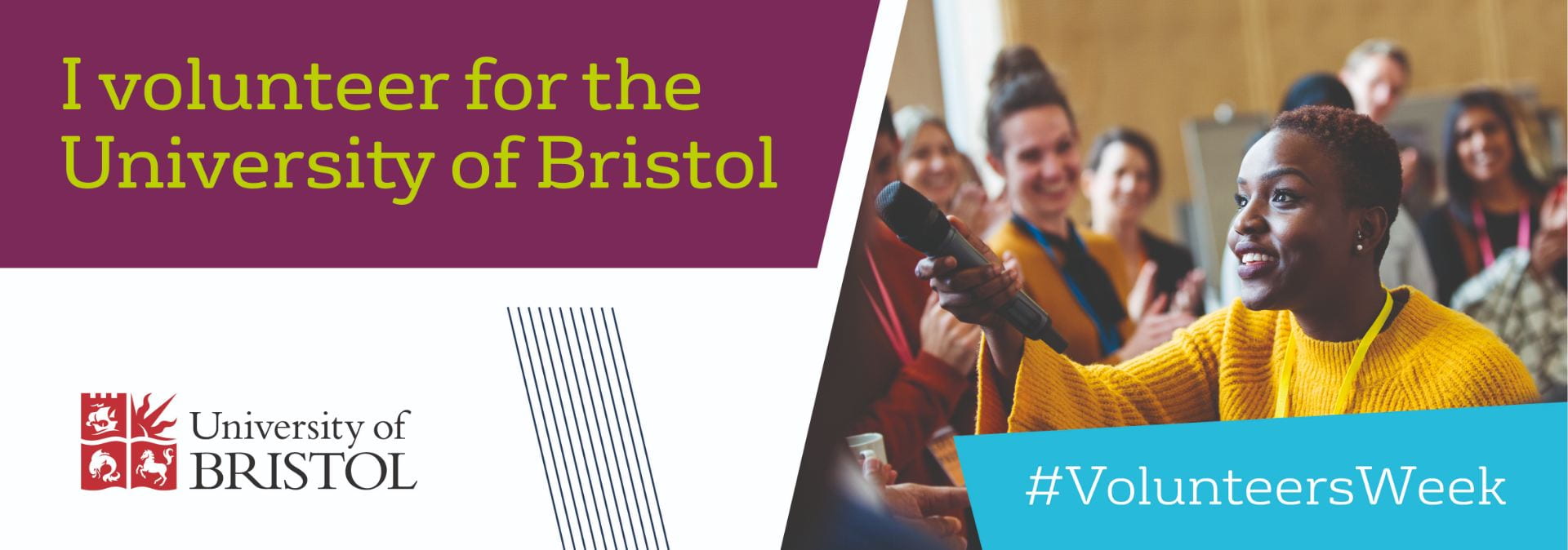
Throughout the year we work across departments to match our alumni volunteers with relevant and rewarding opportunities. To keep up to date with our latest volunteering opportunities sign-up to our Bristol Volunteers digest, or explore our ongoing volunteering opportunities online.
Bristol Mentors
This week marks the end of a successful first year of our alumni mentoring programme. Bristol Mentors supports current students who are under-represented in higher education, and we’re looking for Bristol alumni to take part as volunteer mentors for 2019/20.
If you think you can share your professional experience, career insight and support current students at the University, we’d love to hear from you. We would particularly welcome interest from Black, Asian and Minority Ethnic (BAME) graduates with an interest in supporting students. This year we have a large number of applications from students who identify as BAME and have expressed an interest in working with a BAME mentor.
To find out more visit our website or contact alumni-mentoring@bristol.ac.uk.
Bristol Career Insights events
We are looking for alumni speakers and networkers who can share their career stories, give exclusive insights into their industries and share their experience at our upcoming Bristol Career Insights events:
Bristol, Thursday 13 June 2019
London, Tuesday 18 June 2019
Hong Kong, Thursday 11 July 2019
Singapore, Saturday 13 July 2019
Kuala Lumpur, Monday 15 July 2019
If you could support current students and recent graduates looking to take the next steps in their careers please get in touch with the Bristol Volunteers team at alumni-volunteers@bristol.ac.uk.
Welcome volunteers for our incoming international students
Our Global Opportunities team are planning a range of events and opportunities to welcome our incoming international students. We are looking for expressions of interest from alumni who can help give a warm and personal welcome to Bristol.
Events will be held on campus in the International Welcome Lounge from 9 to 13 September and 15 to 27 September.
Please send expressions of interest to alumni-volunteers@bristol.ac.uk.
Chair of the Cambridge Branch of the University of Bristol Alumni
After 10 years in the role, Alison Wilson (BA 1966) will be stepping down as Chair of the Cambridge Branch in October.
The Chair works closely with the University and members of the network to organise a calendar of events throughout the year, offering alumni the chance to connect and socialise.
To find out more about the role please contact the Bristol Volunteers team at alumni-volunteers@bristol.ac.uk.
Annual Golf Day co-ordinator
We are looking for keen golfers to take a lead on co-ordinating our annual Golf Day. Golf Day has been running for 10 years and sees alumni take on staff and students for an afternoon of sport and socialising.
To find out more please contact the Bristol Volunteers team at alumni-volunteers@bristol.ac.uk.
Clifton Hill House Association
Anthony Duncalf, current Physics student (2018- ), is starting an Association for alumni of Clifton Hill House.
There has been plenty of interest from current students, and Anthony is now looking for local Clifton Hill House alumni to participate in initial meetings to shape the network, and possibly join the Committee.
To find out more please contact the Bristol Volunteers team at alumni-volunteers@bristol.ac.uk.
Bristol Mentors: helping to shape students’ futures
Lucy Downer, Final Year English BA Undergraduate, talks about her fantastic experience of having an alumni mentor with the Bristol Mentors programme.
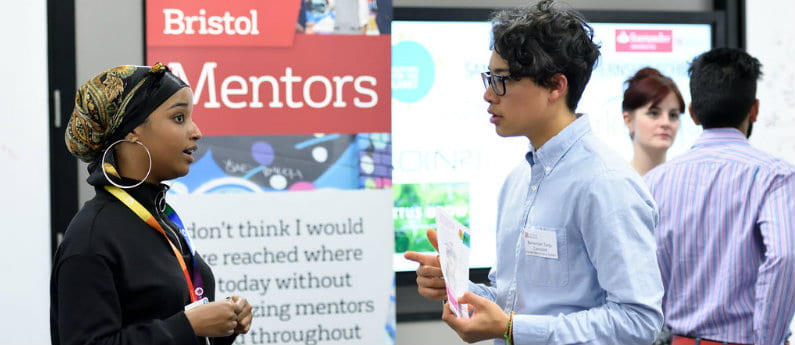
 “Starting out as a third-year student I felt incredibly daunted by the prospect of life post-graduation. Being part of the Bristol Mentors programme this year has given me invaluable experience within an industry I am considering entering after graduation.
“Starting out as a third-year student I felt incredibly daunted by the prospect of life post-graduation. Being part of the Bristol Mentors programme this year has given me invaluable experience within an industry I am considering entering after graduation.
I’m considering becoming a journalist, and so being matched with my alumni mentor – a news editor at The Guardian – felt like a dream fit straight away!
Getting to talk to someone who has come from a similar position as you and has achieved so much was incredibly inspiring. My mentor has given me great advice and contacts within the journalism industry and practical advice on how to seek and ask for work experience.
Probably the highlight has been having the opportunity to visit my mentor at her place of work in London and having an informal day’s work experience at The Guardian. Due to the competitive nature of work experience positions at the company this was an experience I might never otherwise have gained.
I was shown around The Guardian headquarters and attended the morning news meeting. I then met with a range of editors on the news team, and even had the opportunity to pitch article ideas to the section’s main editor.
I’ve since applied to a master’s programme in journalism and a scholarship programme offered by The Guardian, to encourage students from socio-economically disadvantaged backgrounds into the industry.
The scheme helped not only to encourage me to think about my career prospects but made me feel less daunted by the prospect of doing so; with the support of my mentor and some great people at the Careers Service, planning life after university hasn’t feel like such a big leap.
I think it’s easy to feel quite lost if you don’t have a definite plan for life after university, and even though my future isn’t completely mapped out and my career choice set in stone, I have so much more knowledge and experience of how to succeed in the working world after graduation.
I can’t recommend this programme highly enough!”
To find out more about how you could become a Mentor, and to learn about our other Volunteering opportunities, please visit our dedicated online page.
Arts Careers Week a soaring success thanks to our alumni
Humanities, Modern Languages and School of Arts students were wowed with the passion, knowledge and expertise of the alumni volunteers who came back to Bristol to talk all things careers during this year’s ‘Arts Careers Week’. Run by the Faculty of Arts and Careers Service, this year saw a week of talks and panel events geared up to get students thinking about the kinds of jobs they could go into upon graduating.

For the first time, this December we also hosted a careers networking evening which proved to be a real hit with our students. Feedback received was hugely positive from the event, which allowed students to talk to alumni from a whole host of different areas from TV to Law about how they found their career calling over drinks and nibbles.
Now in its third year, this year we saw our highest ever attendance figures, which is a real testament to the quality of the talks that our alumni give. Panel sessions were held on careers in law, banking and finance, charity and the not for profit sector, working in higher education, media and journalism, publishing, advertising, event management, languages careers and working in the film and TV industry, to name but a few!
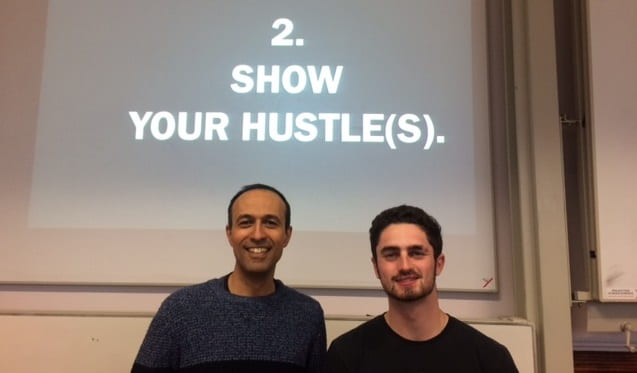
Special thanks go out to the following alumni, who gave up their time and travelled from far and wide to be there to give something back:
- Mu Ali (Classics, studied a little while ago, in his words!) who works as Chief Growth Officer for media agency Wavemaker UK has attended Arts Careers Week for the second time running, where his talks on working in advertising shed light on the pros and cons of the sector, as well as his top tips for success, including bringing all of yourself to work. Mu has also assisted English student, Josh Peleg, to find an internship opportunity in advertising.
- Charlotte DC (BA Philosophy 2013) works as the Event Manager for MOMA festivals and told us about the ‘glamorous 1%’ of what still sounds like a very cool job!
- Lucinda Elliott (BA Spanish & Portuguese 2012) was kind enough to fly from Brazil where she is now a journalist covering South America, to remind students of the benefits of doing a languages degree, and the amazing possibilities this opens to them upon graduation.
- Rosanna Quigley (BA French & Portuguese 2015) works as a Conference and Event Manager and gave a down to earth recollection of what it’s like to enter a competitive job market for the first time, but how beneficial her experiences on her year abroad in France were to her current career.
- Katie Foxall (BA English Literature 1997) works in Publishing for e Cancer, a site that provides free oncology information and education worldwide and talked to students about the various paths available in the publishing industry, as well as the importance of gaining all-important work experience whilst studying.
- Rosalind Neely (BA French and German 1984), Freelance Editor, Proof Reader and Project Manager for Illustrated Art Books provided an insight into the varied and rewarding career of an experienced publisher.
- Francesca Wilson (BA History of Art 2011), Arts Charity Director of Programming and Development for a non-profit organisation called the Easel Initiative was inspiring and open about working in the sector and the importance of opening up the arts industry to a wider and more diverse audience.
- Eleanor Boyer (BA English 2015), who now works at Google in the Government and Public Policy team, allowed students to consider how their degrees can have more of a relationship to working in the tech industry than they might at first think.
- Sarah Pitt (BA English Literature & Community Engagement 2014), who works as the MD for MSP TV has attended both our networking evening and our session on Film and TV! Her wisdom on the area and channelled creativity were truly second to none.
- Natasha Riordan-Eva (BA Music 2011), Event Manager at the Southbank Centre specialising in classical music, captivated the audience with her experiences of being at Bristol and how this has helped her in her career, including achieving her life-long aspiration of presenting on BBC Radio 3).
- Piers Alder (BA English 1988) works as a Copywriter and extolled the virtues of working freelance, writing for a living and being able to work on a variety of different projects and initiatives.
- Hannah Armstrong (BA Archaeology and Anthropology 2010), Principal Heritage Consultant at Pegasus Group, works in the planning sector and advises on heritage assets. It was interesting to see how relevant a degree in Archaeology and Anthropology can be to the legal world.
- Gemma Brace (MA History of Art 2010), Exhibitions and Engagement Officer at the University of Bristol highlighted the dedication, passion and drive that go into forging a career in the arts and culture sector.
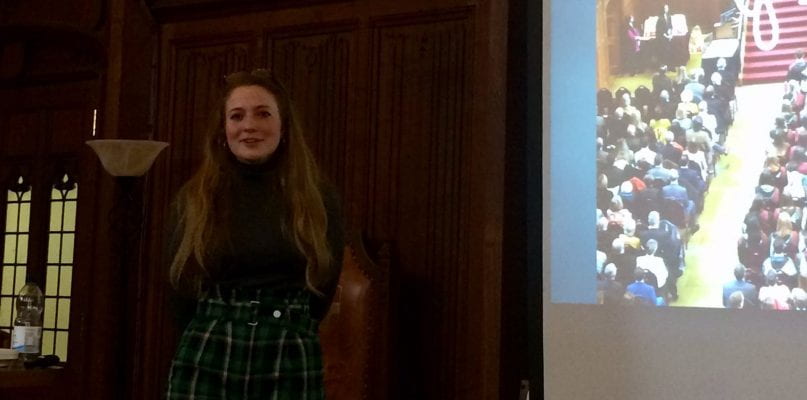
To all the alumni who contributed to our events this year, including those who could not attend but would have liked to, we would like to extend a huge thanks from all of us in the Faculty of Arts and Careers Service. Your input is invaluable to our students and provides both a source of inspiration and greater clarity on what it’s really like to work in your chosen sectors.
Faculty of Arts alumni: please get in touch with Anona Williams (Faculty of Arts) if you would like to get involved in future events, interviews or promotional videos at anona.williams@bristol.ac.uk.
Find out more about the Bristol Volunteers programme for alumni.
Cambridge Branch spring event, 4 May 2019
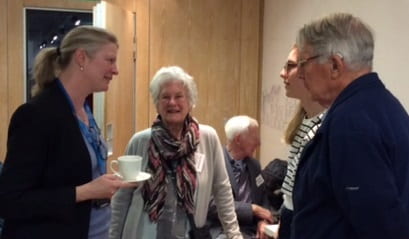
Alison Wilson (BA 1966)
Cambridge is celebrating a significant event this year, the 200th anniversary of the founding of the Cambridge Philosophical Society. Among its members were some of the most famous scientists in the world, many of them Nobel Prize-winners. CBBA’s spring event this year was a visit to an exhibition at the University Library entitled ‘Discovery’ showcasing books, papers and equipment to illustrate the achievements of these Cambridge scientists. We were hosted by the Librarian, Dr Jessica Gardner, who formerly held the same post at the University of Bristol. She began with a lecture, which was in three parts; first some information about the proposed new Main Library in Bristol with slides showing the situation and concept, then an introduction to Cambridge University Library and the many initiatives which are making it a more open and interactive place and thirdly an introduction to the exhibition and its treasures. After a short break for refreshments she mingled with the group as they viewed the items: Newton’s annotated copy of ‘Principia’, Darwin’s own copy of his ‘Origin of the Species’, Lord Rayleigh’s home-made equipment for studying waves, Bell-Burnell’s chart from which she deduced pulsars, and much more. Jess made us feel very welcome and we are most grateful to her for the private view.
We then adjourned to nearby Clare College for a delicious ‘champagne tea’. Sitting at round tables 44 people greeted old friends and got to know new members. We all enjoyed this stimulating afternoon, connecting us back to Bristol.
Alison will be standing down as Chair of the Cambridge Branch at the AGM in October. Alumni interested in the role are asked to please email alumni-volunteers@bristol.ac.uk.
Congratulations to our London Marathon team
On 28 April 2019, seven Bristol alumni, staff and students ran the London Marathon in support of Healthy Minds, a physical activity programme at the University which taps into the benefits of exercise to support students affected by mental ill health.
Thank you to Chloe, Chris, Grace, Jack, Marissa, Sam and Verity, who raised a fantastic total of £15,276.31. We are delighted to congratulate them on their success, and share their thoughts about the experiences they had running for Bristol.
“I couldn’t have been more proud to represent the University at such a fantastic event. It was unforgettable.
The moment I found out that I had received a Golden Bond place I was overjoyed and overwhelmed and filled with happiness. I have always wanted to run a marathon, but not just any marathon; for many years my eyes have been set on London. The London Marathon was absolutely incredible. It was such a special and momentous experience and I will never forget it.
Before I ran the marathon, I said that it would be the first and the last purely based on the commitment to the training plan alongside other commitments. Not even a week after running it, I have not only entered the ballot for London next year, I have also entered the Manchester Marathon in 2020.
The crowds and support in London on the day of the marathon were on a whole new level. The experience was so different to any race I had ever done before, and I would happily run the London Marathon each and every single year if I could. I managed to finish the London Marathon in a time of exactly 4 hours! Just 1 second off my target, but that’s the price that has to be paid for a perfectly paced and perfectly timed marathon – so I’ve been told! I’ll get it next time!”
“The marathon gave me a goal, an objective, something to strive for outside of a professional setting. It gave me an active lifestyle and embodied everything that Healthy Minds stands for, for myself. One week after the London Marathon, I woke up and felt strange for not having to go out and complete my Sunday long run – something that I had been doing for the past 5 months. I realised that the training has enforced a habit, which at its worst forces me not to look at a screen for a couple of hours and at best gives me a huge endorphin rush when I break a personal best. I have now signed up for the London Triathlon, Olympic distance, at the end of July. This should theoretically be easier than the Marathon, but is another venture to seek out.
It is quantifiable how much running the marathon has helped me with dealing with my grief, but I recognise that I am now in a better mental position than I was in before I started training, and that exact opportunity is what I want to thank Bristol for.”
“It was an incredible experience, and I was overwhelmed by the support of the crowds! I managed to see Jack and Chris also running for Bristol at the start line, but ran for most the way with another alumni student who I’d been at University with. I was honoured to be running for such an important cause.”
“The whole London Marathon experience is one that I’ll never forget. For every mile of the race (and every mile during training), it felt so meaningful to do it for a cause that was much greater than just my own personal athletic goals. The work I put into training was fuelled by my motivation to give back to the University of Bristol’s Healthy Minds Programme – an initiative that I care deeply about and resonates with me. The marathon race itself was like a victory lap around the great city of London, to celebrate months of training and generous funding from all my supporters.”
“It was an incredible day, the crowds were fantastic and the atmosphere like nothing I’ve experienced. I set myself three goals for the day: 1. Finish. 2. Try to do this in under 4 hours. 3. Try to do this without walking.
Everything was going well and I was exceeding expectations up to mile 19 in Canary Wharf, but nothing prepares you for the physical and mental anguish of hitting ‘the wall’. I’d experienced glimpses of what I thought was the wall in the training. Forcing your body to keep moving when every signal it’s giving you says it’s a terrible idea is really tough.
When I stepped over the finish line I felt an enormous sense of pride in what I’d accomplished, not just over the past 3 hours and 50 minutes, but over the whole 6 month period of training. I honestly can’t think of a more appropriate way to raise money for the University’s Healthy Minds Programme than by taking on the mental and physical battle of the marathon, and would encourage anyone, particularly those who struggle with their mental health, to take on the challenge in the future.”
Feeling inspired? The University of Bristol has five places in the 2020 Virgin Money London Marathon, and applications for the places will open in Autumn this year. For more information, please contact alumni-marathon@bristol.ac.uk.
Forest 404: Bristol Drama alumni across generations come together in ambitious BBC Radio 4 ecothriller
Four Bristol alumni take part in BBC Radio 4’s recent ambitious podcast projects, Forest 404 – a 27 part podcast series starring alumna Pearl Mackie. The series is accompanied by a national experiment looking at how listening to natural sounds could boost wellbeing.
The BBC is launching an innovative 27-part sci-fi podcast series, which imagines a futuristic world in which forests have been erased from history. Forest 404 is described as a first for BBC podcasts. Its three-tiered structure creates a new listening experience which aims to draw the audience deeper into the world of the podcast.
At its heart is a classic sci-fi thriller set in the 24th century following a data crash called The Cataclysm. The action follows the character Pan (Mackie), a sound archivist who uncovers some sound recordings from the early 21st century that haunt her. They are recordings of rainforests, places which no longer exist, and Pan feels compelled to hunt down the truth about how the forests of the old world died.
Award-winning writer Timothy X Atack, Becky Ripley, award-winning BBC producer and director, and Pearl Mackie who starred in Dr Who, and Pippa Haywood who starred in Bodyguard and the Green Wing, all read their BA in Theatre and Drama at the University of Bristol. The project is a first for BBC podcasts in that it is part of a wider academic research project too. The series offers an additional dimension to an Arts and Humanities Council (AHRC)-funded project looking at the world of wildlife filmmaking over the last 25 years, particularly the world-famous BBC Natural History Unit in Bristol.
Led by Alexander Smalley, a Virtual Nature Researcher at the University of Exeter, Forest 404: The Experiment hopes to develop a unique insight into how the British public respond to nature-based sounds. Peter Coates, Professor of American and Environmental History from the University of Bristol’s Department of History, is the wildlife filmmaking project’s academic lead.
Professor Coates and his colleagues see the podcast and BBC project as part of an emerging area of academic research – the environmental humanities – whose starting point is the belief that a scientific perspective is not enough to do full justice to our complex and many layered relationships with nature.
About Forest 404: the series
Each of the nine talks is delivered by a wide range of speakers including musicians, biofuturists, bioethicists and anthropologists. They delve into the themes which inspired the drama, such as: “Why should I listen to trees?”, “Would you vote for an AI government?” and “What is death in the digital age?” to explore the real-life ideas which inspired the drama.
The soundscapes designed by Graham Wild and Becky Ripley, which bring each episode of the thriller to life, are mixed to create an immersive 3D experience for the listener. A rainforest symphony, an orchestra of frogs, a montage of whale song and a sonic woodland walk make up some of the sounds of nature which sit alongside more experimental soundscapes as the narrative unfolds.

About Forest 404: The Experiment
The podcasts are accompanied by an ambitious online survey devised and operated by researchers at the University of Exeter and The Open University which hopes to develop a unique insight into how the British public respond to nature-based sounds.
This survey promises to make a major contribution to what we already know about how contact with nature benefits our physical and mental wellbeing. It will contribute new knowledge by exploring how people respond to various sounds of nature; previous research has concentrated on the visual.
Alex Smalley said: “A large body of evidence shows that spending time in natural environments can have positive effects on people’s wellbeing. But we know very little about the importance of sound in this relationship.
Could simply listening to birdsong or waves lapping on the beach be enough to help people recover from a stressful situation? The effects won’t be the same for everyone so we want as many people as possible to take part in this study, helping us uncover what works and why.
Anyone over the age of 18 can take part in the experiment. Participants will be asked to listen to several different sounds and will need to have headphones or speakers at the ready. It’s hoped the study’s findings will form the basis for bringing the benefits of nature to people who might not be able to access them, such as patients in hospital, older people in long term care, or those who work in stressful situations.
Take the survey: https://nquire.org.uk/mission/forest-experiment/contribute
Listen to the series on BBC Sounds: https://www.bbc.co.uk/programmes/p06tqsg3


